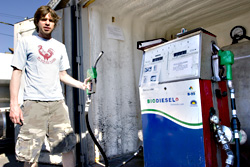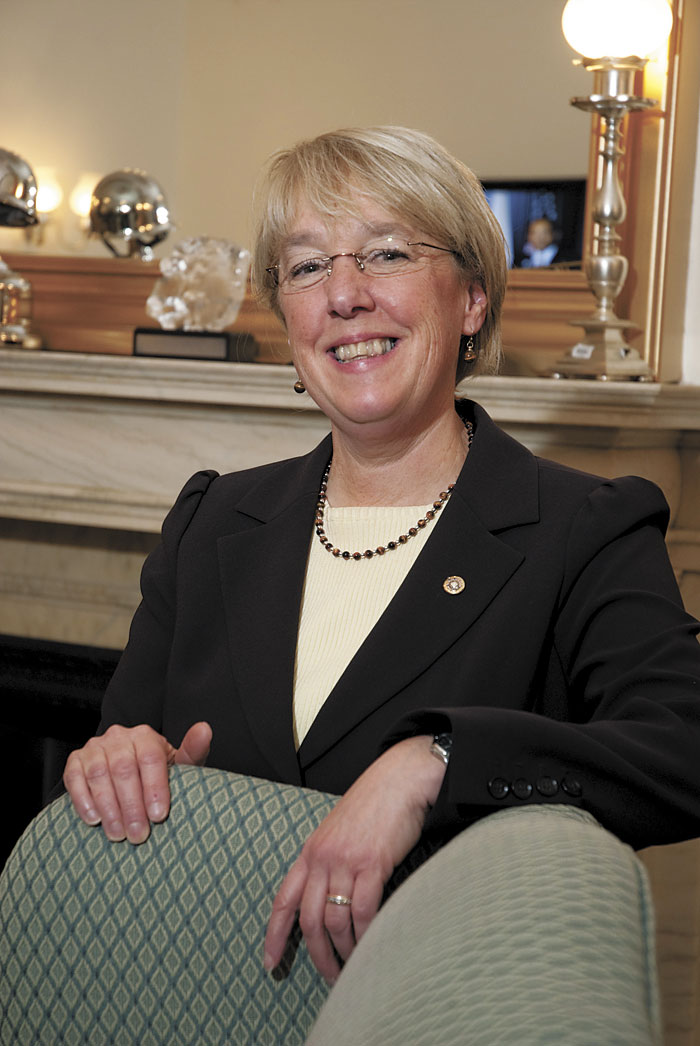On a recent sunny afternoon, Michael Chamberlin pulls his Ford pickup truck into Dr. Dan’s Alternative Fuelwerks in Ballard, where he sticks his key card into the slot and begins to fill up for about $3.40 per gallon.
Why biodiesel? “Why not?” Chamberlin replies. “Why wouldn’t I? It’s a simple solution.” Asked if he cares what kind of oil the fuel is made from—soy? canola? palm?—Chamberlin is ambivalent. “It’s doesn’t matter as long as it’s biodiesel,” he says.
“Fuck yeah, it matters,” counters Nico Juarez, as he fills up his Chevy van with biodiesel across town at Laurelhurst Oil. “If it was my way, it would be all dumpster oil. You can’t get any more local, more recyclable than that.”
Juarez got into biodiesel six years ago when he bought a 500-gallon tank and started mixing his own, collecting used oil from fryer vats in local restaurants. If the oil to make biodiesel isn’t collected or grown locally, he reasons, it takes more energy to get it to the pump than it does regular diesel fuel.
“People say, ‘I’m green, I’m running around in my TDI [Volkswagen Passat].’ They’re hypocrites,” Juarez says. “They run around with stuff that smells good, thinking they’re all liberal with clean shit in their tank, but where did it come from? It infuriates me.”
Indeed, Seattle’s biodiesel enthusiasts come in many shades of green. And their personal differences are reflective of a budding war between entrepreneurs as the biodiesel industry sits on the cusp of a local explosion.
In the next few months alone, Imperium Renewables (formerly Seattle Biodiesel) plans to open a plant in Grays Harbor capable of producing 100 million gallons of biodiesel a year. Propel Biofuels plans to open between four and six retail biodiesel stations in Seattle and surrounding cities. Safeway plans to open its second biodiesel station in Ballard (the first one opened in West Seattle in February). And Planetary Fuels plans to open a biodiesel production facility in South Seattle.
Those on the growth side of the industry say it’s important that biodiesel reach as many people as possible; that the alternative needs convenience to gain traction. But those on the greener side say biodiesel is in danger of being corrupted—that where the fuel comes from and how it gets here is more important than simply sticking the word “bio” in front of it and marketing to the masses.
Biodiesel can be made from a wide variety of plant oils and animal fats. Most of the biodiesel produced in the United States (including the fuel sold at Dr. Dan’s and Laurelhurst Oil) comes from soybeans grown in the Midwest. (Juarez, for the record, says he was filling up at the pump that day for purely practical reasons: It takes a lot of time and money to clean and process dumpster oil to the point where it can be used as fuel.)
Dan Freeman, the eponymous founder of Dr. Dan’s who’s been selling biodiesel in Ballard for six years, says he too would prefer to get his stock from local sources. Short of that, he says trains are the most energy-efficient way to get the fuel here, and that domestic soybean oil is the best substance to make it with.
Dr. Dan’s represents the ma-and-pop quotient in the local biodiesel scene. The Ballard station’s pump is housed in a metal shed that sits in front of Freeman’s office, a hole-in-the-wall room stacked high with books and jars of different grades of biodiesel and frequented by folks who forget their key cards or have questions about how to work the machine.
From behind his cluttered desk, Freeman says he’s concerned about Imperium’s Grays Harbor plant amid reports that a percentage of its product may be made from palm oil shipped from Malaysia. He says this defeats biodiesel’s purpose for two reasons: It takes a lot of energy to get fuel here from Malaysia, and rain forests are often cleared in order to grow palmcrops.
“If you’re not doing it sustainably, you’re doing it irresponsibly,” he says. “And that will damage both the industry and the environment.”
It also doesn’t help that Propel Biofuels, which plans to sell Imperium’s product, is opening its first Seattle station a couple blocks down the street from Dr. Dan’s. “They’re trying to cut into the market we created,” Freeman says.
Propel founder Rob Elam says they’re opening in Ballard simply because of demand. When asked about Freeman, Elam says, “We all fueled there. We respect that he’s been a pioneer in the space. Everybody respects his contributions.”
Elam’s company plans to open six stations in the Seattle area over the next several months. The first four will likely open in Kenmore, Maple Valley, Bellevue, and Lake Forest Park in a matter of weeks, with the Ballard station following shortly thereafter. (All openings are dependent on Propel making it through the permitting process.) The sixth station is planned for South Lake Union.
Though his company plans to get its fuel from Imperium, Elam insists Propel won’t buy palm oil–based products. “Our customers don’t want it,” he says. “It defeats the purpose of biodiesel, transporting it long distances, destroying rain forest habitat.”
Imperium president and founder John Plaza says Washington alone could produce enough biodiesel to power the Grays Harbor plant. But the state has yet to tap the full extent of this potential. However, a new law approved by the state legislature in 2006, which requires biodiesel to account for at least 2 percent of the diesel sold in the state, could serve as a catalyst and give local farmers an incentive to grow canola, a popular fuel source. In the meantime, Imperium has committed to producing 1 percent of its 100 million annual gallons of biodiesel from Washington-grown canola.
Plaza says he can’t specify where the rest of the company’s oil will come from, in part because sources fluctuate based on price and availability. He offers that Imperium “won’t use feedstocks that are grown in a nonsustainable manner.” But Plaza doesn’t rule out shipping in palm oil from Malaysia. “We want to use whatever oil’s cheapest,” he says.
Plaza believes the issue for new energy sources is bigger than palm oil. “Everybody focuses on palm oil, but what are we going to do about our overall energy consumption?” he says. “Sustainable biofuels is one thing, [but] we also need conservation…There are many ways to look at this. To target one little issue doesn’t address the problem. We need to look at ways to sustainably and practically grow this industry, rather than tear it apart before it gets started.”
Furthermore, Plaza says it’s possible to obtain palm oil from plantations that already exist. The trees, which have a 30-year life cycle, produce multiple crops that can be harvested year-round, he says. But Duff Badgley, who heads a Seattle-based group called One Earth which staged a protest outside of Imperium’s downtown Seattle offices last week, calls sustainable palm oil “an industry-financed hoax.”
“The law in the marketplace is when the demand goes up, the trees go down,” he says. “American drivers are complicit in this. All they want is their tanks full regardless of the source. People want guilt-free driving, but they need to make the distinction between large-scale and local.”
For his part, Propel’s Elam, who grew up in Minnesota, says he’s been environmentally active since he was a kid, but adds that he’s become isolated over the years from “utopian hardcore” environmentalists.
“The hardcore environmental movement has become so disconnected from pragmatic solutions,” says Elam. “They do nothing but yell from their ivory tower, which allows big oil to keep the status quo. We want the most local, sustainable biodiesel that meets our cost and quality standards. But you have to put one foot in front of the other and understand it’s one step at a time to get there. We must understand it will be a dirty, clumsy process to make change.”






